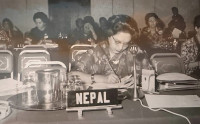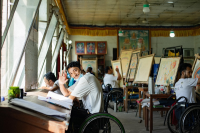Culture & Lifestyle
How intergenerational trauma influences our families
To break from the pattern of unaddressed trauma, we need to discuss every member’s experiences of sorrow, pain, shame, guilt, grief and other intense emotions.
Tashi Gurung
After a long day at work one day, I was searching for a movie to watch—nothing serious or hard-hitting—just pleasant to wind down to. I considered putting on an animated movie as I hadn’t watched one in a while. I watched ‘Inside Out’ a few years back and was surprised by the things it addressed. The nuanced way it displayed emotions of a person’s psyche made for a good watch.
I decided to watch ‘Encanto’ this time around. The movie, with its varied characters and lively songs, portrays the huge effect trauma can have on a person’s psyche—it influences their motivation, behaviour and the entire structure and dynamics of their family.
The matriarch grandmother of Mirabel (the protagonist) experiences a very traumatic moment in her life—she has to be displaced from her village due to armed conflict. While fleeing with her family, she sees her husband being killed as he tries to hold off the army. Much of the movie focuses on the grandmother’s refusal to acknowledge the pain, shock and extreme sorrow of the event. Mirabel tries to address it in her own lighthearted way.
The traumatic event’s narrative had been shifted in the family. The life-altering event that the grandmother went through is portrayed to bring out a miracle—a burning candle that begets magic for the entire family and consequently builds an entire village. Perceiving it as a miracle has helped the family to prosper and grow, but unconsciously and implicitly, the pain is never addressed. This narrative is not uncommon in the families and communities around us.
Every family goes through their own struggles, pain and sorrow. But somehow, these experiences are never discussed. They are never put out in the open. Furthermore, they are hidden. They are kept in the dark veil of secrecy. There is so much shame associated with it that families choose to avoid it, no matter how intense it gets.
Not addressing this trauma brings out a lot of internal struggles and mechanisms in the individual family members. Many of the family members in the movie are constantly trying to put up with the perfectionist ideals that the grandmother has set. But the more these ideals are put in the family members, the more inadequate and incapable they feel.
This paradox, I have noticed, happens a lot in my clients’ experiences with their family members, especially parents. The more insecure the parent feel about themselves, the more they push their child to work against those same insecurities. But the push in itself becomes so strong and overpowering for the child that no matter their efforts, they would always feel insecure about themselves.
A lot of emotions, hence, can be transferred intergenerationally. A renowned psychotherapist Esther Perel, whose parents were Holocaust survivors, mentioned that the trauma her parents experienced shaped her upbringing and largely influenced how she parented her children. The strong drive for her children to be self-reliant, even at a young age, to prepare for the possibility of her not being there came from her parents pushing her that way.
So how do we work around this? We can find the answer to that in the popular song from ‘Encanto’, titled ‘We do not talk about Bruno.’
Bruno is Mirabel’s estranged uncle, who the grandmother banished from the family. The reason was: he had shared the truth about the family’s fate. While the grandmother didn’t look upon this favourably, this is exactly what we should do to overcome our trauma. Talking about it and openly discussing it.
The family was finally forced to confront their trauma when Mirabel started being inquisitive about it. Ultimately, acknowledging it brings the whole family together. To break from the pattern of unaddressed trauma, we need an open space to discuss and share the family’s history: their experiences of sorrow, pain, shame, guilt, grief and other intense emotions.
Even if there is resistance and hesitation inside the family, one of the ways to navigate can be by undergoing counselling and psychotherapy. Once our individual trauma and struggles are addressed, we can break the chain and help other family members improve too. I have often heard from my clients that the family dynamics tend to change, even when only a single member is in therapy.
The greatest gift in counselling and psychotherapy is insight and awareness. With the awareness and understanding of trauma and how that impacts each and every family member, we can create a solid base and foundation for healing and prevent future pervasive intergenerational trauma.




 8.4°C Kathmandu
8.4°C Kathmandu















